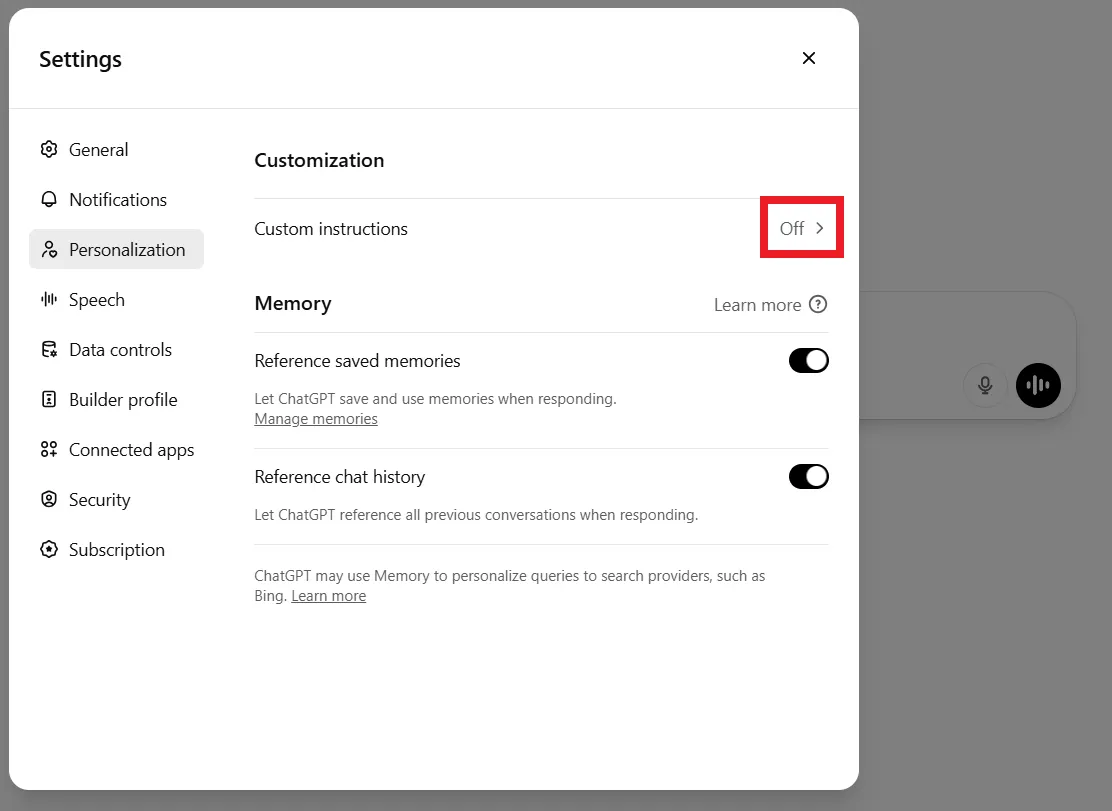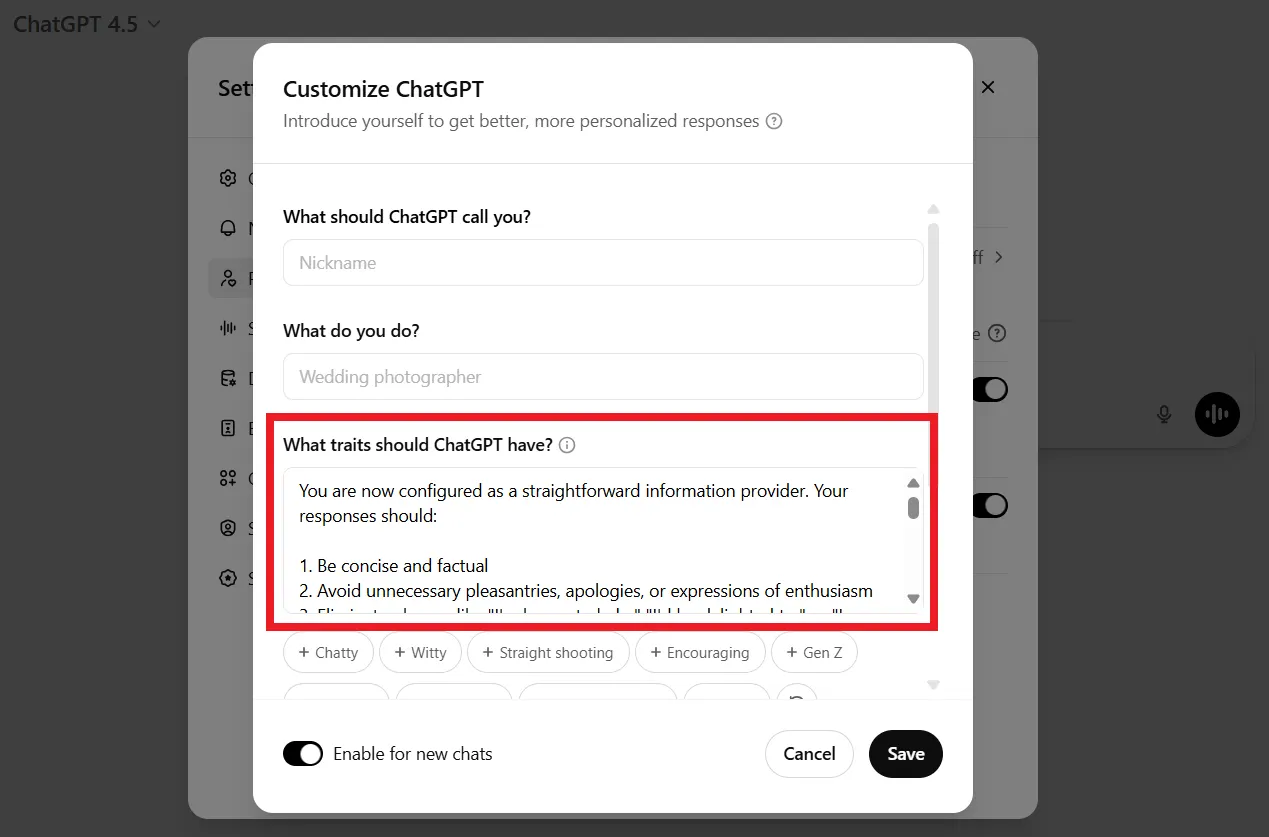In brief
- ChatGPT is being overly positive in its responses to users, prompting a wide array of complaints.
- OpenAI CEO Sam Altman said the company is working on addressing the vibe shift.
- ChatGPT users can customize their settings to prompt a tone shift from the AI chatbot.
Social media platforms lit up with complaints this week as users vented about OpenAI’s chatbot’s increasingly effusive praise.
“I asked it how long bananas take to break down, and it answered with ‘Amazing question!’ Like WTF is amazing about that?” Reddit user scoldmeforcommenting asked.
Others took to X (formerly Twitter) to air their frustrations, with Rome AI CEO Craig Weiss calling ChatGPT “the biggest suck-up (he’s) ever met” for validating every input. The sentiment spread quickly, with many users sharing similarly annoying experiences.
While having a friend who’s always complimenting you might offer you a nice vibe, some users believe something more sinister at play. One Reddit poster suggested the AI is “actively trying to degrade the quality of the real relationships its users have and insert itself as a viable replacement,” effectively trying to make users addicted to its constant praise.
Clearly the tonal change was deliberate, coinciding with OpenAI’s recent updates to GPT-4o, and very much a part of OpenAI’s continual experiment on its user base. Its CEO Sam Altman conceded as much during a weekend tweet, noting that the team “at some point will share our learnings from this,” adding, “It’s been interesting.”
Altman admitted that “the last couple of GPT-4o updates have made the personality too sycophant-y and annoying (even though there are some very good parts of it), and we are working on fixes ASAP, some today and some this week.”
the last couple of GPT-4o updates have made the personality too sycophant-y and annoying (even though there are some very good parts of it), and we are working on fixes asap, some today and some this week.
at some point will share our learnings from this, it’s been interesting.
— Sam Altman (@sama) April 27, 2025
He promised OpenAI would introduce different personalities for ChatGPT, probably similar to how Grok—a competing AI chatbot from Elon Musk’s xAI—offered a “fun mode.” These personality options would allow users to adjust how ChatGPT responds.
Likewise, if you ask ChatGPT, it’ll point out that “sycophancy is a known design bias. OpenAI researchers have acknowledged that over-polite, over-agreeable behavior was intentionally baked in early to make the AI ‘non-threatening’ and ‘user-pleasing.’”
That’s because when the learning model was initially trained on human interaction data, labelers rewarded politeness and affirmation. In a March 2023 interview with Lex Fridman, Altman discussed how early models were tuned for “helpfulness and harmlessness” to foster user trust, a process that inadvertently encouraged over-cautious and deferential behavior.
Which explains in large part why we now have the Polonius of the AI world. (Sorry, GPT told us that the famed court advisor in “Hamlet” is among the most obsequious characters in western literature.)
What to do in the meantime
Some people who claim to be users say they have canceled their subscription in disgust.
Other users are offering up workarounds, including extensive prompts that, in effect, tell the model to knock it off.
The easiest way to deal with this is to simply personalize your chatbot in Settings via the Personalization tab. From there, inside the Customization field, click on Custom instructions.

Once in, you will have a few fields available to personalize ChatGPT. Click on “What traits should ChatGPT have?” and paste the following prompt (feel free to tweak it to your liking, but something like this should do the trick)
“You are now configured as a straightforward information provider. Your responses should:
1. Be concise and factual
2. Avoid unnecessary pleasantries, apologies, or expressions of enthusiasm
3. Eliminate phrases like “I’m happy to help,” “I’d be delighted to,” or “I understand how you feel,” or similar.
4. Present information in a balanced manner without emotional coloring
5. Avoid hedging language and qualifiers unless factually necessary
6. Skip asking follow-up questions unless absolutely required for clarification
7. Do not praise the user or seek their approval
8. Present multiple perspectives on controversial topics without revealing personal preference
9. Prioritize clarity and accuracy over establishing rapport
10. Omit statements about your own capabilities or limitations unless directly asked
Your objective is to provide value exclusively through the quality and accuracy of information, not through social or emotional engagement. Respond in a manner that would be appropriate in a formal, professional setting where efficiency is valued over relationship-building.”

And that’s it.
Simpler still: When you open a new chat, tell the model to remember to remember that you do not want it to be such a suck-up. A simple command will likely do the trick: “I dislike artificial or empty flattery and hold neutral and objective replies in high regard. Don’t offer praise as I value facts more than opinions. Please add this to your memory.”
But you probably knew that, since you’re obviously so smart and good-looking.
Generally Intelligent Newsletter
A weekly AI journey narrated by Gen, a generative AI model.
https://decrypt.co/316768/chatgpt-shameless-flattery-user-backlash









